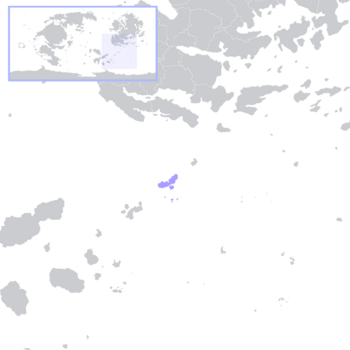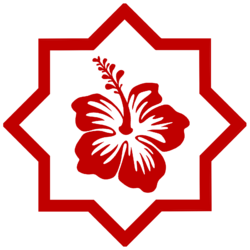Glanodel
Glanish Commonwealth Glansk Fristatens | |
|---|---|
| Motto: "Juntas prevaleceremos." "Together we shall prevail." | |
 Location of Glanodel (blue), region (blue box) | |
| Capital | Vænholm |
| Largest | Graylund |
| Official languages | None federally recognized |
| Recognised national languages | Lhedwinic (Glanish dialect), Midrasian, Newreyan, Aquidish, Vrnallian |
| Ethnic groups | Glanish (80.2%), Newreyan (8.3%), Vrnallian (6.5%), Nausikaan (2.1%), Oser (1.9%), Other Lhedwinic (1%) |
| Demonym(s) | Glanish · Glens |
| Government | Federal presidential constitutional republic |
| Noah A. Mikkelsen | |
• House Speaker (President pro tempore) | Karla L. Kruse |
• Chancellor | David L. Vestergaard |
| Legislature | Congress of the Commonwealth (Kongres Glanodæl) |
| Council of State (Senatet) | |
| National Council (Nationalråd) | |
| Establishment | |
• King's Day | 1 February 954 |
• Two Chambers Day | 5 March 1158 |
• Revival Day | 5 March 1900 |
| Area | |
• | 236,326 km2 (91,246 sq mi) |
• Water (%) | 18% |
| Population | |
• 2016 estimate | |
• 2015 census | 14,019,103 |
• Density | 62.921/km2 (163.0/sq mi) |
| GDP (PPP) | 2016 estimate |
• Total | $0.89 trillion |
• Per capita | $59,864 |
| GDP (nominal) | 2016 estimate |
• Total | $0.965 trillion |
• Per capita | $64,948 |
| Gini (2014) | low |
| HDI (2014) | very high |
| Currency | Gælder (Gilder) (GO) |
| Driving side | right |
| Calling code | +55 |
| ISO 3166 code | GLN |
| Internet TLD | .gln |
Glanodel (Glanish-Lhedwinic: Glanódæl), officially the Glanish Commonwealth (Glanish-Lhedwinic: Glansk Fristatens), is a federal republic in Asura. It consists of 13, semi-autonomous cantons and the city of Vænholm is the seat of the federal government. The country is situated along the Northeast side of the archipelago Lhedwin and is bordered by Navack to the south, the Arctic Ocean to the north and west, and the Asuran Channel to the east. Glanodel is a mostly island, maritime country geographically separated into three areas by Norfeld defining its northern border and Sørfeld defining its southern, spanning an area of 236,326 square kilometres (91,246 sq mi). The Glanish population of 14.8 million, 4.2 million of whom are of a foreign background, is concentrated mostly within its major coastal cities, where the largest Glanish cities are found: among them are the two global cities and economic centers Graylund and Ellesø.
The origins of the modern Glanish culture can be traced back to the emergence of the Dalish tribes at the start of the Iron Age which dominated most of the region now known as Glanodel. As a single, unified country, the nation owes its origins to the establishment of the Kingdom of Glanodel in 1158 with the crowning of King Ögri Vænström. From the 14th to the 17th century, the Northern Renaissance shaped much of modern Glanish political, economic, and social ideology. It also led to the emergence of the nascent, liberal-leaning movement which dominated national policy towards the mid-17th century until the Kingdom joined the union of the United Kingdom of Lhedwin alongside the former Kingdoms of Navack and Crylante. Lhedwinic occupation of Glanodel ended with the nation's liberation by the Grand Alliance in 1899. The subsequent ratifying of the Grundlov (National Constitution) on 5 March 1900, established the Glanish Commonwealth. Facing great challenges following the end of the Great War due in large part to war losses, a majority of the first half of the 20th century was spent on reconstruction, inspiring the name "Reconstruction Era". Glanodel emerged as a dominant manufacturer in the growing world economy throughout the 1930s and 40s. The 1950s saw the empowerment of unions, numerous economic reforms, and unemployment benefits, as well as publicly-funded pensions, universal health care, and greater investments in both public and private education.
In its current form, Glanodel's national legislature is the elected, bicameral Congress of the Commonwealth: composed of the Council of State (Senatet; upper house), presided over by Chancellor David Vestergaard; and the National Council (Nationalråd, lower house), presided over by House Speaker Karla Kruse. Executive political power is exercised by the Cabinet, presided over by President of the Commonwealth Noah Mikkelsen, who serves as the nation's head of state and government.
The Glanish people enjoy one of the highest standards of living and the country ranks highly in numerous comparisons of national performance such as education, healthcare, protection of civil liberties, democratic governance, prosperity and human development. Glanodel is frequently ranked as one of the happiest countries in the world and has the world's highest social mobility rate with a high level of income equality and one of the world's highest per capita incomes. Glanodel also has one of the most ethnically diverse populations in Asura, with non-Glanish ethnicities making up roughly 45% of the nation's population. Glanish national identity is rooted in widely shared values of equality, the main inspiration behind its frequent use of referendums. As guaranteed by its Constitution, Glanish citizens reserve the right to freely practice any religion they chose, with Trúathi and Alydianism being the two most commonly practiced religions.
The 21st century saw the rise of Glanodel as a major power in Lhedwinic foreign affairs and a minor power within Asuran politics. Since the nation's rise to economic power in the 1990s, Glanodel has held a consistent place as having the highest per capita income in the world and one of the most economically competitive nations in the world. Glanodel has also emerged as a primary contributor to the 's northern missions, along side Newrey, and is a key proponent in the formation of the Lhedwin Council and the CDN. Glanodel is often referred to by numerous multinational magazines, tourism industries, and news outlets as both one of the world's major "cultural hubs", as well as a "hub of debauchery and indulgence". Glanish cultural achievements are widely known and Glanodel is most commonly known around the world for its famous authors, critically acclaimed musicians and classical orchestras, and its internationally recognizable movies and television shows. In addition, Glanodel is known for having far-libertarian social policies especially in comparison to other developed nations, such as legalized public nudity and even prostitution, as well as a plethora of controlled substances approved for recreational use.


